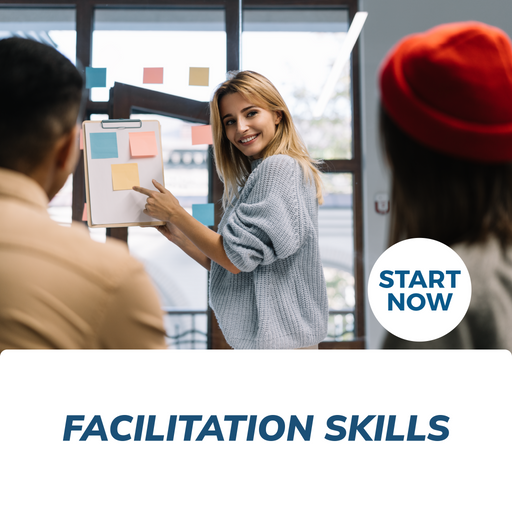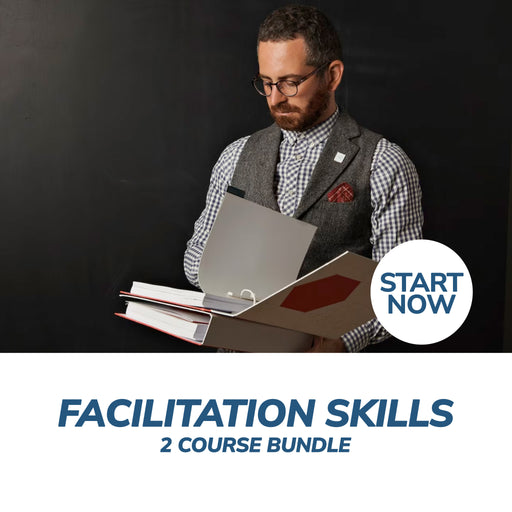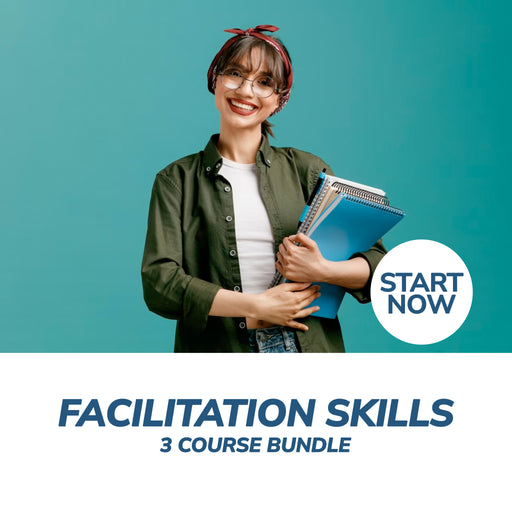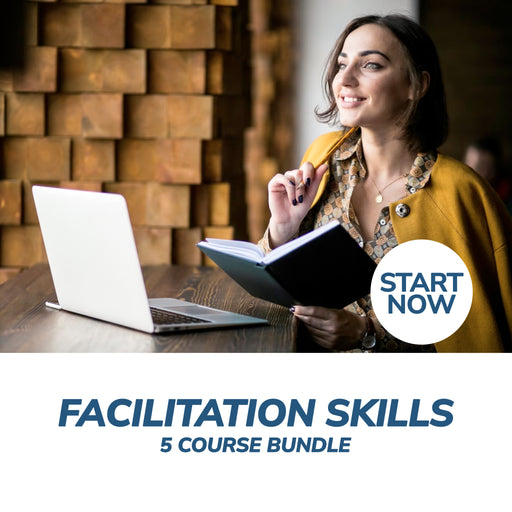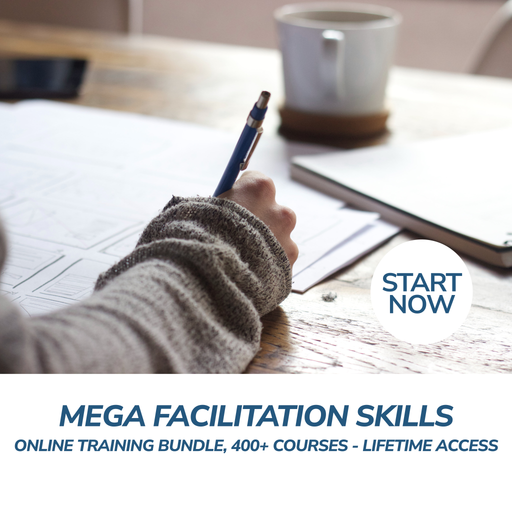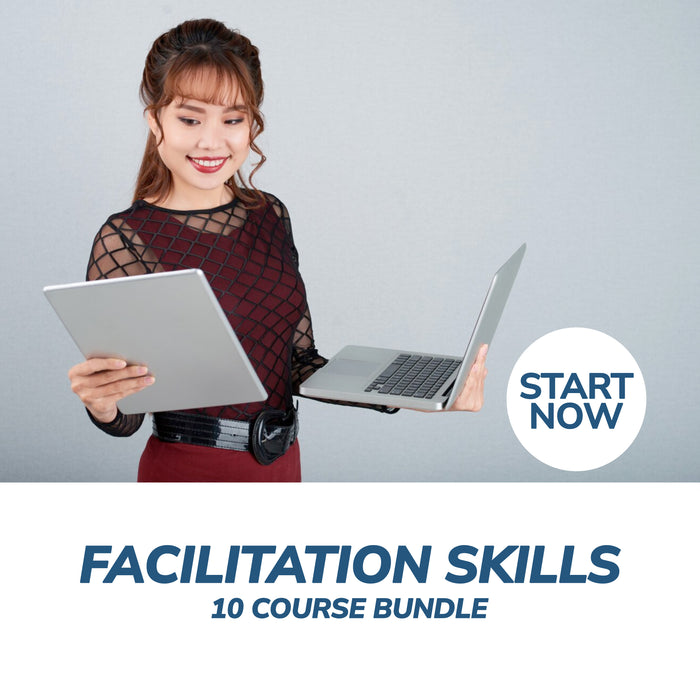
About This Course
What you will learn: Study Facilitation Skills Online Course and Learn How to Lead Meetings and Discussions More Effectively
|
|
Get BIG Savings with our Facilitation Skills Online Bundle, 10 Certificate Courses
- Facilitation Skills
- Conflict Resolution
- Negotiation Skills
- Interpersonal Skills
- Communication Strategies
- Managing Effective Meetings
- Creative Problem Solving
- Critical Thinking
- Delegation
- Social Intelligence
1. Facilitation Skills: How to Lead Meetings and Discussions More Effectively
Facilitation is often referred to as the new cornerstone of management philosophy with its focus on fairness and creating an easy decision making process.Creating a comfortable environment through better facilitation will help you understand what a good facilitator can do to improve any meeting or gathering and put the theory into practice yourself. This Facilitation Skills course can help any scale of organization make better decisions, you will gain a strong understanding of what facilitation is all about, as well as learn new tools that you can use to facilitate small meetings. Additionally you will learn to command a room and dictate the pace of a meeting, skills that will set you up to become a great facilitator yourself.
2. Conflict Resolution: Learn How To Resolve Conflicts of Any Size
There are many ways to resolve conflicts - surrendering, running away, overpowering your opponent with violence, filing a lawsuit, etc.
Conflict resolution grew out of the belief that there are better options than using violence or going to court. Today, conflict resolution is used in a wide range of industries covering an array of different situations. This course will demonstrate the six-step process to resolve conflicts of any size.
You will also learn crucial conflict resolution skills, including dealing with anger and using the Agreement Frame.
3. Negotiation Skills: Understand The Phases Of Negotiation
Although people often think of boardrooms, suits, and million dollar deals when they hear the word negotiation, the truth is that we negotiate all the time.
This course will give you an understanding of the phases of negotiation, tools to use during a negotiation, and ways to build win-win solutions for all those involved.
The Negotiation Skills course will give you a sense of understanding your opponent and have the confidence to not settle for less than what you feel is fair. You will learn that an atmosphere of respect is essential, as uneven negations could lead to problems in the future.
4. Interpersonal Skills: Learn Powerful Communication Skills!
We've all met that dynamic, charismatic person that just have a way with others, and has a way of being remembered. You will identify ways of creating a powerful introduction, remembering names, and managing situations when you’ve forgotten someone’s name.
The Interpersonal Skills course will help you work towards being that unforgettable person by providing communication skills, negotiation techniques, tips on making an impact, and advice on networking and starting conversations. You will also identify the skills needed in starting a conversation, moving a conversation along, and progressing to higher levels of conversation.
5. Communication Strategies: Build Better, Stronger, and More Fulfilling Relationships
For the better part of every day, we are communicating to and with others. Whether it’s the speech you deliver in the boardroom, the level of attention you give your spouse when they are talking to you, or the look that you give to the cat, it all means something.
This course will help you understand the different methods of communication and how to make the most of each of them.
6. Managing Effective Meetings: Achieve Your Goals With Effective Team Meetings
This course is targeted at individuals and groups who require an understanding of the basics of workplace meeting management, and more importantly, how to ensure that meetings are effective.
You are on your first project and you have to organize and manage the project kick-off meeting. What do you do first? Do you create the agenda or the invitation list? How do you run a meeting? What preparation do you need? All of these are valid and real questions you, as the meeting manager, must address. There is no doubt about it. Meetings require skill and technique in order for the meeting to achieve its purpose. Disorganized and poorly managed meetings waste time and hurt your credibility as a meeting manager. Consistently leaving a poor impression with the attendees will haunt you if left unchecked.
The Managing Effective Meetings Online Course is designed to give you the basic tools you need to initiate and manage your meetings. You will learn planning and leading techniques that will give you the confidence to run a meeting that will engage your attendees and leave a positive and lasting impression.
7. Creative Problem Solving: Solve Problems Quickly and Easily
In the past few decades, psychologists and business people alike have discovered that successful problem solvers tend to use the same type of process to identify and implement the solutions to their problems. This process works for any kind of problem, large or small.
This course will give you an overview of the entire creative problem solving process, as well as key problem solving tools that you can use every day.
8. Critical Thinking: Analyze and Evaluate Information to Boost Your Performance
Critical Thinking provides you with the skills to analyze and evaluate information. With these skills you are able to obtain the greatest amount of knowledge from a piece of data. It provides the best chance of making the correct decision, and minimizes damages if a mistake does occur.
Our Critical Thinking course will lead you to be a more rational and disciplined thinker. It will reduce bias which will provide a greater understanding of the environment. This course will provide you with the skills to evaluate, identify, and distinguish between relevant and irrelevant information which will provide an incredible boost in performance.
9. Delegation: Learn The Art Of Delegating Effectively
Effective delegation is one of the most valuable skills you can master. It reduces your workload while developing employee skills and preparing them for advancement. This course will explore the delegation process and give you the skills you need to start delegating effectively.
This course will teach you how delegation can make you more successful, ways that you can delegate, techniques for giving instructions, how to monitor delegation results, and how to give good feedback. You will also learn an eight-step delegation process that you can customize for any situation.
10. Social Intelligence: Increase Your Influence During Social Situations
Social Intelligence is about understanding your environment and having a positive influence. You will become more confident in social situations by learning how to express and interpret social cues. You will create positive connections and increase your influence during social situations.
Increasing Social Intelligence will provide benefits throughout professional and personal life. It is a fantastic tool for coaching and development as people will learn “people skills”. Improving social skills through active listening, understanding body language, and being more empathic will give you the advantage in interactions. Social interactions are a two way street, know the rules of the road!
Receive Lifetime Access to Course Materials, so you can review at any time.
For comprehensive information on units of study click the units of study tab above.
This is an incredible opportunity to invest in yourself and your future, sharpen your training skills and learn what it takes to create your own success with Courses For Success Today!
Course Fast Facts:
- All courses are easy to follow and understand
- Only 6 to 8 hours of study is required per course
- Unlimited lifetime access to course materials
- Study as many courses as you want
- Delivered 100% on-line and accessible 24/7 from any computer or smartphone
- You can study from home or at work, at your own pace, in your own time
- Certificate of Completion
Course Delivery
Courses are accessed online via our learning management system by any device including PC, MAC, tablet or Smart Phone.
Recognition & Administration
Upon successful completion of this course and achieving a passing score for the assessment, you will be issued with an international continuing education credit (CEU) certificate.
This Certificate is applicable worldwide, which demonstrates your commitment to learning new skills. You can share the certificate with your friends, relatives, co-workers, and potential employers. Also, include it in your resume/CV, professional social media profiles and job applications.
Units of Study
Receive Lifetime Access to Course Materials, so you can review at any time.
The Ultimate Facilitation Skills 10 Course Bundle includes the following courses, below is a summary of each course:
Course 1 - Facilitation Skills
Module One - Getting Started
Module Two - Understanding Facilitation
- What is facilitation?
- What is a facilitator?
- When is facilitation appropriate?
Module Three - Process vs Content
- About process
- About content
- A facilitator's focus
Module Four - Laying the Groundwork
- Choosing a facilitated approach
- Planning for a facilitated meeting
- Collecting data
Module Five - Tuckman and Jensen's Model of Team Development
- Stage One - Forming
- Stage Two - Storming
- Stage Three - Norming
- Stage Four - Performing
Module Six - Building Consensus
- Encouraging participation
- Gathering information
- Presenting information
- Synthesizing and Summarising
Module Seven - Reaching a Decision Point
- Indentifying the options
- Creating a short list
- Choosing a solution
- Using the multi-option technique
Module Eight - Dealing with Difficult People
- Addressing disruptions
- Common types of difficult people and how to handle them
- Helping the group resolve issues on their own
Module Nine - Addressing Group Dysfunction
- Using ground rules to prevent dysfunction
- Restarting and reframing issues
- Some of the ways of restarting and reframing includes
- Getting people back on track
Module Ten - About Intervention
- Why intervention may be necessary
- When to intervene
- Levels of intervention
Module Eleven - Intervention Techniques
- Using your processes
- Boomerang it back
- ICE it - Identify, Check for agreement, Evaluate how to resolve
Module Twelve - Wrapping Up
Course 2 - Conflict Resolution
Section One: Getting Started
Section Two: Introduction to Conflict Resolution
- Conflict, What Is It?
- What is Effective Conflict Resolution?
- Understanding the Effective Conflict Resolution Process
Section Three: Effective Conflict Resolution Styles
- Collaborating
- Competing
- Compromising
- Accommodating
- Avoiding
Section Four: Creating a Communicative Atmosphere
- Defuse Emotions
- Setting Ground Rules
- Choosing the Time and Place
Section Five: Mutual Understanding
- What Do I Want?
- What Do They Want?
- What Do We Want?
Section Six: Focusing on Individual and Shared Needs
- Identify Common Ground
- Build Positive Energy and Goodwill
- Strengthen Your Partnership
Section Seven: Analysing to the Root Cause
- Examining Root Causes
- Creating a Cause and Effect Diagram
- Identifying the Benefits of Resolution
Section Eight: Create Options
- Generate, Don’t Evaluate
- Creating Mutual Gain Options and Multiple Option Solutions
- Digging Deeper into Your Options
Section Nine: Solution Building
- Creating Criteria
- Creating a Shortlist
- Choosing a Solution
- Building a Plan
Module Ten: The Short Version of the Process
- Evaluating the Situation
- Choosing Your Steps
- Creating an Action Plan
- Using Individual Process Steps
Module Eleven: Additional Tools
- Stress and Anger Management Techniques
- The Agreement Frame
- Asking Open Questions
Module Twelve: Wrapping Up
Course 3 - Negotiation Skills
Module One - Getting Started
Module Two - Understanding Negotiation
- Types of negotiations
- The three phases
- Skills for successful negotiation
Module Three - Getting Prepared
- Establishing your WATNA and BATNA
- Identifying your WAP
- Identifying your ZOPA
- Personal preparation
Module Four - Laying the Groundwork
- Setting the time and place
- Establishing common ground
- Creating a negotiation framework
- The negotiation process
Module Five - Phase One - Exchanging Information
- Getting off on the right foot
- What to share
- What to keep to yourself
Module Six - Phase Two - Bargaining
- What to expect
- Techniques to try
- How to break an impasse
Module Seven - About Mutual Gain
- Three ways to see your options
- About mutual gain
- Creating a mutual gain solution
- What do I want?
- What do they want?
- What do we want?
Module Eight - Phase Three - Closing
- Reaching consensus
- Building an agreement
- Setting the terms of the agreement
Module Nine - Dealing with Difficult Issues
- Being prepared for environmental tactics
- Dealing with personal attacks
- Controlling your emotions
- Deciding when it's time to walk away
Module Ten - Negotiating Outside the Boardroom
- Adapting the process for smaller negotiations
- Negotiating via telephone
- Negotiating via email
Module Eleven - Negotiating on Behalf of Someone Else
- Choosing the negotiating team
- Covering all the bases
- Dealing with tough questions
Module Twelve - Wrapping Up
Course 4 - Interpersonal Skills
Module One - Getting Started
Module Two - Verbal Communication Skills
- Listening and hearing: they aren't the same thing
- Asking questions
- Communicating with power
Module Three - Non-Verbal Communication Skills
- Body language
- The signals you sent to others
- It's not what you say, it's how you say it
Module Four - Making Small Talk and Moving Beyond
- Starting a conversation
- The four levels of conversation
Module Five - Moving the Conversation Along
- Asking for examples
- Using repetition
- Using summary questions
- Asking for clarity and completeness
Module Six - Remembering Names
- Creating a powerful introduction
- Using Mnemonics
- Uh-oh... I've forgotten your name
Module Seven - Influencing Skills
- Seeing the other side
- Building a bridge
- Giving in without giving up
Module Eight - Bringing People to Your Side
- A dash of emotion
- Plenty of facts
- Bringing it all together
Module Nine - Sharing your Opinion
- Using I-messages
- Disagreeing constructively
- Building consensus
Module Ten - Negotiation Basics
- Preparation
- Opening
- Bargaining
- Closing
Module Eleven - Making an Impact
- Creating a powerful first impression
- Assessing a situation
- Being zealous without being offensive
Module Twelve - Wrapping Up
Course 5 - Communication Strategies
Section One: Getting Started
Section Two: The Big Picture
- What is Communication?
- How Do We Communicate?
- Who’s Listening?
Section Three: Barriers to Communication
- It All Starts with Me
- Common Barriers to Communication
- Language Barriers
- Cultural Barriers
- Location Barriers
Section Four: Paraverbal Communication Skills
- The Power of Pitch
- The Power of Tone
- Vocal Speed Camera
Section Five: Non-Verbal Communication
- Your Body Speaks its own Language
Section Six: Speak Like a STAR
Using STAR
- Situation
- Task
- Action
- Response
Section Seven: Listening Skills
- Ten Ways to Listen Better Today
- Understanding Active Listening
- Sending Positive Signals to Others
Section Eight: Asking Good Questions
- Asking Open Questions
- Probing Questions
Section Nine: Appreciative Inquiry
- The Four Stages
- The Purpose of Appreciative Inquiry
Section Ten: The Art of Conversation Using SPEAC
- Suppose
- Prepare
- Enquire
- Ascertain
- Change
Section Eleven: Advanced Communication Skills
- Precipitating Factors
- Common Ground
Section Twelve: Wrapping up
Course 6 - Managing Effective Meetings
Getting Started
- What this course will cover
- Course Objectives
Section One – Meeting Basics
- What do I need for my meeting?
Section Two – The Agenda
- Agenda Structure
- Things to consider
- Preparation and time
- Choosing an Agenda Format
Section Three: Preparation, Pre-Reading
- What preparation might participants need?
- How can the organizer facilitate the participants’ preparation?
Section Four: Using Technology
- What Technology do I need?
- Managing the technology
Section Five: Logistics
- Logistical Needs?
Section Six: Regular Meetings
- Formal meeting needs
- Regular informal meetings
Section Seven: Larger Meetings/Events
- Additional requirements for larger meetings?
Section Eight: Conducting an effective meeting
- Running the Meeting
Section Nine: Role Play
- Role Play
Section Ten: Minutes and follow ups
- Format and taking of Minutes
Section Eleven: Improving your meetings
- What can be improved?
Section Twelve: Additional Considerations
- Do you need to have a meeting?
- Pre-warning
- Games
- Incentives/prizes
Course 7 - Creative Problem Solving
Section One: Getting Started
- Objectives
- Action Plans
Section Two: The Problem Solving Method
- What is a Problem
- What is Creative Problem Solving?
- What are the Steps for Creative Solving?
Section Three: Gathering Information
- Understanding Types of Information
- Identifying Key Questions
- Methods for Information Gathering
Section Four: Problem Definition
- Defining the Problem
- Determining Where the Problem Originated
- Defining Present State and Desired States
- Stating and Restating the Problem
- Analyzing the Problem
- Writing the Problem Statement
Section Five: Getting Prepared to Brainstorming
- Identifying Mental Blocks
- Removing Mental Blocks
- Stimulating Creativity
Section Six: Generating Solutions, Part One
- Brainstorming Rules (Key to Success)
- Basic Brainstorming
- Brainwriting and Mind Mapping
- Brainwriting
- Mind Mapping
Section Seven: Generating Solutions, Part Two
- The Morphological Matrix
- The Six Thinking Hats
Section Eight: Analyzing Solutions
- Developing Criteria
- Analyzing Wants and Needs
- Using Cost/Benefit Analysis
Section Nine: Selecting a Solution
- Final Analysis
- Paired Comparison Analysis
- Analyzing Potential Problems
- Analyzing Potential Problems
Section Ten: Planning Your Next Steps
- Lesson One: Identifying Tasks
- Identifying Resources
- Implementing, Evaluating, and Adapting
Section Eleven: Lessons Learned
- Planning the Follow-Up Meeting
- Celebrating Successes
- Identifying Improvements
Section Twelve: Wrapping Up
Course 8 - Critical Thinking
Module One - Getting Started
Module Two - Components of Critical Thinking
- Applying reason
- Open Mindedness
- Analysis
- Logic
Module Three - Non-Linear Thinking
- Step out of your comfort zone
- Don't jump to conclusions
- Expect and initiate change
- Being ready to adapt
Module Four - Logical Thinking
- Ask the right questions
- Organise the data
- Evaluate the information
- Draw conclusions
Module Five - Critical Thinker (Part 1)
- Active listening
- Be curious
- Be disciplined
- Be humble
Module Six - Critical Thinking (Part 2)
- Seeing the big picture
- Objectivity
- Using your emotions
- Being self-aware
Module Seven - Evaluate the Information
- Making assumptions
- Watch out for the bias
- Ask clarifying questions
- SWOT analysis
Module Eight - Benefits of Critical Thinking
- Being more persuasive
- Better communication
- Better problem solving
- Increased emotional intelligence
Module Nine - Changing your Perspective
- Limitations of your point of view
- Considering others viewpoint
- Influences on bias
- When new information arrives
Module Ten - Problem Solving
- Identify inconsistencies
- Trust your instincts
- Asking why?
- Evaluate the solution(s)
Module Eleven - Putting it all Together
- Retaining your new skills
- Reflect and learn from mistakes
- Always ask questions
- Practicing critical thinking
Module Twelve - Wrapping Up
Course 9 - Delegation
Session 1: Course Overview
- Learning Objectives
- Pre-Assignment Background
Session 2: Why Delegate?
- Advantages and Disadvantages of Delegating
- More on Delegation
- Delegation Do's and Don'ts
- Self-Assessment
Session 3: What is Delegation?
- Delegation Definitions
- Four Basic Steps to Delegation
- Levels of Delegation
- Breaking Down the Model
- Guidelines for Success
- What to Delegate
- Lateral Delegation
Session 4: Pre-Assignment Review
- Pre-Assignment Review
Session 5: Picking the Right Person
- Demonstrated Skill
- Employee Motivation
- Matching Skills and People
Session 6: The Delegation Meeting
- Delegation Assignment Steps
Session 7: Putting it into Practice
- Case Study
- Activity
- Steps for a Delegation Meeting
Session 8: Giving Instructions
- Three Types of Instructions
- Requests
- Suggestions
- Preparing Instructions
Session 9: Monitoring Delegation
- Why Should You Monitor Delegation?
- How Do You Monitor?
Session 10: Practicing Delegation
- Decision One
- Your Employees
- How Do You Monitor?
- Decision Two
- Decision Three
- Decision Four
- Decision Five
Session 11: Giving Feedback
- The Ingredients of Good Feedback
- Characteristics of Effective Feedback
- Case Studies
Session 12: Becoming a Good Delegator
- Characteristics of Effective Delegators
Session 13: A Personal Action Plan
- Starting Point
- Short-Term Goals and Rewards
- Long-Term Goals
Course 10 - Social Intelligence
Module One - Getting Started
Module Two - Increase your Self Awareness
- Remove or limit self-deception
- Ask for feedback
- Be open to change
- Reflect on your actions
Module Three - The Keys to Empathy
- Listening and paying attention
- Don't judge
- Shift your view
- Don't show fake emotion
Module Four - Active Listening
- Attunement
- Don't jump to conclusions
- Shift your focus
- Don't discount feelings
Module Five - Insight on Behavior
- Perception
- Facts vs. emotions
- Online communication
- Listen and watch more
Module Six - Communication
- Give respect and trust
- Be consistent
- Always keep your cool
- Observing body language
Module Seven - Social Cues (Part 1)
- Recognizing social situations
- The eyes have it
- Non-verbal cues
- Verbal cues
Module Eight - Social Cues (Part 2)
- Spectrum og cues
- Review and reflect
- Being adaptable and flexible
- Personal space
Module Nine - Conversation Skills
- Current events
- Conversation topics
- Cues to watch for
- Give people your attention
Module Ten - Body Language
- Be aware of your movements
- It's not what you say, It's how you say it
- Open vs. closed body language
- Communicate with power
Module Eleven - Building Rapport
- Take the high road
- Forget about yourself
- Remembering people
- Ask good questions
Module Twelve - Wrapping Up
Requirements
Entry requirements
Students must have basic literacy and numeracy skills.
Minimum education
Open entry. Previous schooling and academic achievements are not required for entry into this course.
Computer requirements
Students will need access to a computer and the internet.
Minimum specifications for the computer are:
Windows:
Microsoft Windows XP, or laterModern and up to date Browser (Internet Explorer 8 or later, Firefox, Chrome, Safari)
MAC/iOS
OSX/iOS 6 or laterModern and up to date Browser (Firefox, Chrome, Safari)
All systems
Internet bandwidth of 1Mb or fasterFlash player or a browser with HTML5 video capabilities(Currently Internet Explorer 9, Firefox, Chrome, Safari)
Students will also need access the following applications:
Adobe Acrobat Reader
Requirements
Entry requirements:
Students must have basic literacy and numeracy skills.
Minimum education:
Open entry. Previous schooling and academic achievements are not required for entry into this course.
Device requirements:
Students will need access to a computer/any device and the internet.
FAQS
1. Who are Courses For Success?
Courses For Success is a course platform that started in 2008
with 5 courses, since then we have grown to over 10,000 online courses.
Our courses span across the following categories:
•Animal
•Beauty
•Business
•Health & Fitness
•Finance
•Lifestyle
•IT & Software
•Personal Development
•Teaching & Academics
2. Is there a refund/cancellation policy?
Yes, we have a 7-day money-back refund guarantee. Just send us an email to info@coursesforsuccess.com with the subject Courses For Success Refund so we can accommodate your request.
3. What is the FREE Personal Success Training Program?
The Personal Success Training Program
was developed by Courses For Success to help our customers achieve
success. Currently, we are offering this program for FREE with every
course or bundle purchase this month. This is a limited time offer!
4. Are there any requirements to study this course?
No,
anyone who has an interest in learning more about this subject matter
is encouraged to take our course. There are no entry requirements to
take this course.
5. Do I require to have finished high school to complete this course?
No,
you do not require a High School Diploma or to have finished school to
study this course, this course is open to anyone who would like to take
this course.
6. What if English is not my first language?
This
course is provided in English, however, due to the digital nature of
our training, you can take your time studying the material and make use
of tools such as google translate and Grammarly.
7. Is this course online or conducted in person?
All our courses are accessible online on any device. You may complete them at your own pace and at your own time.
8. How do I receive my course?
After
you have completed the payment, you will receive a confirmation email
and tax receipt. You will also receive an email containing your course
login details (username and password), as well as instructions on how to
access and log in to your course via the internet with any device,
please check your junk/spam folder in the event that you do not receive
the email.
9. When does this course start?
Providing
you have internet access you can start this course whenever you like,
just go to the login page and insert your username and password and you
can access the online material.
10. What is online learning like?
Online learning is easy, if not easier than a traditional academic situation.
By studying an online course, the usual boundaries caused by location and time constraints are eliminated, meaning you are free to study where and when you want at your own pace.
Of course, you will need to be able to self-manage your time and be organized, but with our help, you’ll soon find yourself settling into a comfortable rhythm of study.
11. What computer skills do I need for my course?
You
don't need to be a computer expert to succeed with our online training,
but you should be comfortable typing, using the internet and be capable
of using common software (such as Microsoft word).
12. How long will you have access to the online course?
The majority of our courses have unlimited lifetime access, meaning you can access this course whenever you want.
Please also check the course summary, as a small selection of courses have limited access.
13. How long will my course take?
Course duration, is listed under Course Summary
14. Do I need to buy textbooks?
All the required material for your course is included in the online system, you do not need to buy anything else.
15. Is the course interactive?
Yes, all our courses are interactive.
16. Is there an assessment or exam?
Yes,
you will be required to complete a multiple-choice test online at the
end of your course, you can do this test as many times as you require.
17. What type of certificate will I receive?
You
will receive a Certificate of Completion that is applicable worldwide,
which demonstrates your commitment to learning new skills. You can share
the certificate with your friends, relatives, co-workers and employers.
Also, include it in your resume/CV, professional social media profiles
and job applications.
Wendy Sue Hunt - 5 STAR REVIEW
"If you are considering taking any “Courses for Success”, I would highly recommend it. I have always been a firm believer it’s important to always sharpen your skills. You are never too old to learn more. I found the courses very helpful, interesting and easy to understand.
The term “Courses for Success” helped me in my current position to succeed. After completing the courses, I gave my manager the completion certificates. Recently I received a promotion too."
Valencia Marie Aviles - 5 STAR REVIEW
"I
had a very good experience with my course. It has helped me to get
multiple jobs and prepared me for almost everything I would need to
know. The course was very informative and easy to understand and broken
up perfectly to be done in a short amount of time while still learning a
good amount! I would recommend Courses for Success to anyone trying to
get abs certifications for job advancements, it is well worth it!"
ELENA GRIFFIN - 5 STAR REVIEW
"I have absolutely enjoyed the materials from Courses for Success. The materials are easy to understand which makes learning enjoyable. Courses for Success have great topics of interest which make you come back for
more.
Thank you Courses for Success for being part of my learning journey and making education affordable!"
Our
completion certificates are very valuable and will help you progress in
your work environment and show employers how committed you are to learn
new skills, you might even get a promotion.
18. Will this course be credited by universities?
No, it is not equivalent to a college or university credit.
19. Am I guaranteed to get a job with this certificate?
This course will give you the skills you need to help you obtain employment, but it’s up to you if you get the job or not.
20. How will this course assist me with my career?
Studying
and completing this course will show employers that you have the
knowledge in this field, additionally you will gain more confidence in
this area of expertise.
21. How long is the certificate valid for?
The Certificates are valid for life and do not need renewing.
22. Can I take more than one course at a time?
Courses
are studied online at your own pace and you are free to study as many
or as few courses as you wish, we also offer online course bundles that
allow you to save on additional courses so that you may get all the
topics related to your training goals in one go.
23. What are the Payment Methods available? Is there a payment plan?
We accept payments via PayPal, Credit Card and Bank Transfer.
Payment Plans: We have partnered with Partial.ly, to offer our own in house payment plan. Everyone is Pre-Approved, providing the initial deposit is paid in full.
To pay via bank transfer contact us info@coursesforsuccess.com
24. Can I purchase for multiple people?
Yes, you can do this by purchasing individually via website or send us a request via email at info@coursesforsuccess.com
25. Can I request for an invoice before purchase?
Yes, you can request for an invoice via email at info@coursesforsuccess.com
26. Purchase for a gift?
Yes, you can purchase this course as a gift, simply send an email to info@coursesforsuccess.com, with the course details and we can accommodate this.
27. Can I create my own course bundle?
Yes,
you can customize your own bundle. Please send us the complete list
with the exact course link of the courses you'd like to bundle up via
email info@coursesforsuccess.com and we will create them for you. *Each course access, time of completion and certification varies depending on the course type.
28. How will I contact Courses For Success if I have any questions?
You can contact our support team, at any time through live chat on our website, or email at info@coursesforsuccess.com, or by calling one of our phone numbers depending on which country you are in.
Free Personal Success Training Course
The Personal Success Training Program Helps You Stay Focused To Achieve Your Goals!
This month, we are providing it for Free with all Course Purchases, as a special offer!
Benefits:
• How to layout a Success Plan.
• Get where you want to be in life.
• How to unclutter your mind to succeed.
• Achieve your dreams using your imagination.
• How to have faith in yourself.
Features:
• Life time access
• Complement your individual course purchase.
• Click here Personal Success Training Program to see thousands of positive reviews,
Hurry - offer - ends this month!
Course Bundles
Looking for specific training for yourself or employees. Choose from our Course Bundles below or build you own Bundle, by adding more courses to your cart. Choose different courses or the same course for multiple staff members and receive volume discounts at checkout.
Ultimate Facilitation Skills Online Bundle, 10 Certificate Courses
How to Lead Meetings and Discussions More Effectively
Bundle Up & Save - Learn More and Save More when you Upgrade to the Mega Bundle below & Save 98%
Course Summary
- Delivery: Online
- Access: Unlimited Lifetime
- Time: Study at your own pace
- Duration: 6 to 8 hours per course
- Assessments: Yes
- Qualification: Certificate
3 DAY SALE - ENDS MIDNIGHT TODAY
GET IN NOW & SAVE!
About This Course
What you will learn: Study Facilitation Skills Online Course and Learn How to Lead Meetings and Discussions More Effectively
|
|
Get BIG Savings with our Facilitation Skills Online Bundle, 10 Certificate Courses
- Facilitation Skills
- Conflict Resolution
- Negotiation Skills
- Interpersonal Skills
- Communication Strategies
- Managing Effective Meetings
- Creative Problem Solving
- Critical Thinking
- Delegation
- Social Intelligence
1. Facilitation Skills: How to Lead Meetings and Discussions More Effectively
Facilitation is often referred to as the new cornerstone of management philosophy with its focus on fairness and creating an easy decision making process.Creating a comfortable environment through better facilitation will help you understand what a good facilitator can do to improve any meeting or gathering and put the theory into practice yourself. This Facilitation Skills course can help any scale of organization make better decisions, you will gain a strong understanding of what facilitation is all about, as well as learn new tools that you can use to facilitate small meetings. Additionally you will learn to command a room and dictate the pace of a meeting, skills that will set you up to become a great facilitator yourself.
2. Conflict Resolution: Learn How To Resolve Conflicts of Any Size
There are many ways to resolve conflicts - surrendering, running away, overpowering your opponent with violence, filing a lawsuit, etc.
Conflict resolution grew out of the belief that there are better options than using violence or going to court. Today, conflict resolution is used in a wide range of industries covering an array of different situations. This course will demonstrate the six-step process to resolve conflicts of any size.
You will also learn crucial conflict resolution skills, including dealing with anger and using the Agreement Frame.
3. Negotiation Skills: Understand The Phases Of Negotiation
Although people often think of boardrooms, suits, and million dollar deals when they hear the word negotiation, the truth is that we negotiate all the time.
This course will give you an understanding of the phases of negotiation, tools to use during a negotiation, and ways to build win-win solutions for all those involved.
The Negotiation Skills course will give you a sense of understanding your opponent and have the confidence to not settle for less than what you feel is fair. You will learn that an atmosphere of respect is essential, as uneven negations could lead to problems in the future.
4. Interpersonal Skills: Learn Powerful Communication Skills!
We've all met that dynamic, charismatic person that just have a way with others, and has a way of being remembered. You will identify ways of creating a powerful introduction, remembering names, and managing situations when you’ve forgotten someone’s name.
The Interpersonal Skills course will help you work towards being that unforgettable person by providing communication skills, negotiation techniques, tips on making an impact, and advice on networking and starting conversations. You will also identify the skills needed in starting a conversation, moving a conversation along, and progressing to higher levels of conversation.
5. Communication Strategies: Build Better, Stronger, and More Fulfilling Relationships
For the better part of every day, we are communicating to and with others. Whether it’s the speech you deliver in the boardroom, the level of attention you give your spouse when they are talking to you, or the look that you give to the cat, it all means something.
This course will help you understand the different methods of communication and how to make the most of each of them.
6. Managing Effective Meetings: Achieve Your Goals With Effective Team Meetings
This course is targeted at individuals and groups who require an understanding of the basics of workplace meeting management, and more importantly, how to ensure that meetings are effective.
You are on your first project and you have to organize and manage the project kick-off meeting. What do you do first? Do you create the agenda or the invitation list? How do you run a meeting? What preparation do you need? All of these are valid and real questions you, as the meeting manager, must address. There is no doubt about it. Meetings require skill and technique in order for the meeting to achieve its purpose. Disorganized and poorly managed meetings waste time and hurt your credibility as a meeting manager. Consistently leaving a poor impression with the attendees will haunt you if left unchecked.
The Managing Effective Meetings Online Course is designed to give you the basic tools you need to initiate and manage your meetings. You will learn planning and leading techniques that will give you the confidence to run a meeting that will engage your attendees and leave a positive and lasting impression.
7. Creative Problem Solving: Solve Problems Quickly and Easily
In the past few decades, psychologists and business people alike have discovered that successful problem solvers tend to use the same type of process to identify and implement the solutions to their problems. This process works for any kind of problem, large or small.
This course will give you an overview of the entire creative problem solving process, as well as key problem solving tools that you can use every day.
8. Critical Thinking: Analyze and Evaluate Information to Boost Your Performance
Critical Thinking provides you with the skills to analyze and evaluate information. With these skills you are able to obtain the greatest amount of knowledge from a piece of data. It provides the best chance of making the correct decision, and minimizes damages if a mistake does occur.
Our Critical Thinking course will lead you to be a more rational and disciplined thinker. It will reduce bias which will provide a greater understanding of the environment. This course will provide you with the skills to evaluate, identify, and distinguish between relevant and irrelevant information which will provide an incredible boost in performance.
9. Delegation: Learn The Art Of Delegating Effectively
Effective delegation is one of the most valuable skills you can master. It reduces your workload while developing employee skills and preparing them for advancement. This course will explore the delegation process and give you the skills you need to start delegating effectively.
This course will teach you how delegation can make you more successful, ways that you can delegate, techniques for giving instructions, how to monitor delegation results, and how to give good feedback. You will also learn an eight-step delegation process that you can customize for any situation.
10. Social Intelligence: Increase Your Influence During Social Situations
Social Intelligence is about understanding your environment and having a positive influence. You will become more confident in social situations by learning how to express and interpret social cues. You will create positive connections and increase your influence during social situations.
Increasing Social Intelligence will provide benefits throughout professional and personal life. It is a fantastic tool for coaching and development as people will learn “people skills”. Improving social skills through active listening, understanding body language, and being more empathic will give you the advantage in interactions. Social interactions are a two way street, know the rules of the road!
Receive Lifetime Access to Course Materials, so you can review at any time.
For comprehensive information on units of study click the units of study tab above.
This is an incredible opportunity to invest in yourself and your future, sharpen your training skills and learn what it takes to create your own success with Courses For Success Today!
Course Fast Facts:
- All courses are easy to follow and understand
- Only 6 to 8 hours of study is required per course
- Unlimited lifetime access to course materials
- Study as many courses as you want
- Delivered 100% on-line and accessible 24/7 from any computer or smartphone
- You can study from home or at work, at your own pace, in your own time
- Certificate of Completion
Course Delivery
Courses are accessed online via our learning management system by any device including PC, MAC, tablet or Smart Phone.
Recognition & Administration
Upon successful completion of this course and achieving a passing score for the assessment, you will be issued with an international continuing education credit (CEU) certificate.
This Certificate is applicable worldwide, which demonstrates your commitment to learning new skills. You can share the certificate with your friends, relatives, co-workers, and potential employers. Also, include it in your resume/CV, professional social media profiles and job applications.
Units of Study
Receive Lifetime Access to Course Materials, so you can review at any time.
The Ultimate Facilitation Skills 10 Course Bundle includes the following courses, below is a summary of each course:
Course 1 - Facilitation Skills
Module One - Getting Started
Module Two - Understanding Facilitation
- What is facilitation?
- What is a facilitator?
- When is facilitation appropriate?
Module Three - Process vs Content
- About process
- About content
- A facilitator's focus
Module Four - Laying the Groundwork
- Choosing a facilitated approach
- Planning for a facilitated meeting
- Collecting data
Module Five - Tuckman and Jensen's Model of Team Development
- Stage One - Forming
- Stage Two - Storming
- Stage Three - Norming
- Stage Four - Performing
Module Six - Building Consensus
- Encouraging participation
- Gathering information
- Presenting information
- Synthesizing and Summarising
Module Seven - Reaching a Decision Point
- Indentifying the options
- Creating a short list
- Choosing a solution
- Using the multi-option technique
Module Eight - Dealing with Difficult People
- Addressing disruptions
- Common types of difficult people and how to handle them
- Helping the group resolve issues on their own
Module Nine - Addressing Group Dysfunction
- Using ground rules to prevent dysfunction
- Restarting and reframing issues
- Some of the ways of restarting and reframing includes
- Getting people back on track
Module Ten - About Intervention
- Why intervention may be necessary
- When to intervene
- Levels of intervention
Module Eleven - Intervention Techniques
- Using your processes
- Boomerang it back
- ICE it - Identify, Check for agreement, Evaluate how to resolve
Module Twelve - Wrapping Up
Course 2 - Conflict Resolution
Section One: Getting Started
Section Two: Introduction to Conflict Resolution
- Conflict, What Is It?
- What is Effective Conflict Resolution?
- Understanding the Effective Conflict Resolution Process
Section Three: Effective Conflict Resolution Styles
- Collaborating
- Competing
- Compromising
- Accommodating
- Avoiding
Section Four: Creating a Communicative Atmosphere
- Defuse Emotions
- Setting Ground Rules
- Choosing the Time and Place
Section Five: Mutual Understanding
- What Do I Want?
- What Do They Want?
- What Do We Want?
Section Six: Focusing on Individual and Shared Needs
- Identify Common Ground
- Build Positive Energy and Goodwill
- Strengthen Your Partnership
Section Seven: Analysing to the Root Cause
- Examining Root Causes
- Creating a Cause and Effect Diagram
- Identifying the Benefits of Resolution
Section Eight: Create Options
- Generate, Don’t Evaluate
- Creating Mutual Gain Options and Multiple Option Solutions
- Digging Deeper into Your Options
Section Nine: Solution Building
- Creating Criteria
- Creating a Shortlist
- Choosing a Solution
- Building a Plan
Module Ten: The Short Version of the Process
- Evaluating the Situation
- Choosing Your Steps
- Creating an Action Plan
- Using Individual Process Steps
Module Eleven: Additional Tools
- Stress and Anger Management Techniques
- The Agreement Frame
- Asking Open Questions
Module Twelve: Wrapping Up
Course 3 - Negotiation Skills
Module One - Getting Started
Module Two - Understanding Negotiation
- Types of negotiations
- The three phases
- Skills for successful negotiation
Module Three - Getting Prepared
- Establishing your WATNA and BATNA
- Identifying your WAP
- Identifying your ZOPA
- Personal preparation
Module Four - Laying the Groundwork
- Setting the time and place
- Establishing common ground
- Creating a negotiation framework
- The negotiation process
Module Five - Phase One - Exchanging Information
- Getting off on the right foot
- What to share
- What to keep to yourself
Module Six - Phase Two - Bargaining
- What to expect
- Techniques to try
- How to break an impasse
Module Seven - About Mutual Gain
- Three ways to see your options
- About mutual gain
- Creating a mutual gain solution
- What do I want?
- What do they want?
- What do we want?
Module Eight - Phase Three - Closing
- Reaching consensus
- Building an agreement
- Setting the terms of the agreement
Module Nine - Dealing with Difficult Issues
- Being prepared for environmental tactics
- Dealing with personal attacks
- Controlling your emotions
- Deciding when it's time to walk away
Module Ten - Negotiating Outside the Boardroom
- Adapting the process for smaller negotiations
- Negotiating via telephone
- Negotiating via email
Module Eleven - Negotiating on Behalf of Someone Else
- Choosing the negotiating team
- Covering all the bases
- Dealing with tough questions
Module Twelve - Wrapping Up
Course 4 - Interpersonal Skills
Module One - Getting Started
Module Two - Verbal Communication Skills
- Listening and hearing: they aren't the same thing
- Asking questions
- Communicating with power
Module Three - Non-Verbal Communication Skills
- Body language
- The signals you sent to others
- It's not what you say, it's how you say it
Module Four - Making Small Talk and Moving Beyond
- Starting a conversation
- The four levels of conversation
Module Five - Moving the Conversation Along
- Asking for examples
- Using repetition
- Using summary questions
- Asking for clarity and completeness
Module Six - Remembering Names
- Creating a powerful introduction
- Using Mnemonics
- Uh-oh... I've forgotten your name
Module Seven - Influencing Skills
- Seeing the other side
- Building a bridge
- Giving in without giving up
Module Eight - Bringing People to Your Side
- A dash of emotion
- Plenty of facts
- Bringing it all together
Module Nine - Sharing your Opinion
- Using I-messages
- Disagreeing constructively
- Building consensus
Module Ten - Negotiation Basics
- Preparation
- Opening
- Bargaining
- Closing
Module Eleven - Making an Impact
- Creating a powerful first impression
- Assessing a situation
- Being zealous without being offensive
Module Twelve - Wrapping Up
Course 5 - Communication Strategies
Section One: Getting Started
Section Two: The Big Picture
- What is Communication?
- How Do We Communicate?
- Who’s Listening?
Section Three: Barriers to Communication
- It All Starts with Me
- Common Barriers to Communication
- Language Barriers
- Cultural Barriers
- Location Barriers
Section Four: Paraverbal Communication Skills
- The Power of Pitch
- The Power of Tone
- Vocal Speed Camera
Section Five: Non-Verbal Communication
- Your Body Speaks its own Language
Section Six: Speak Like a STAR
Using STAR
- Situation
- Task
- Action
- Response
Section Seven: Listening Skills
- Ten Ways to Listen Better Today
- Understanding Active Listening
- Sending Positive Signals to Others
Section Eight: Asking Good Questions
- Asking Open Questions
- Probing Questions
Section Nine: Appreciative Inquiry
- The Four Stages
- The Purpose of Appreciative Inquiry
Section Ten: The Art of Conversation Using SPEAC
- Suppose
- Prepare
- Enquire
- Ascertain
- Change
Section Eleven: Advanced Communication Skills
- Precipitating Factors
- Common Ground
Section Twelve: Wrapping up
Course 6 - Managing Effective Meetings
Getting Started
- What this course will cover
- Course Objectives
Section One – Meeting Basics
- What do I need for my meeting?
Section Two – The Agenda
- Agenda Structure
- Things to consider
- Preparation and time
- Choosing an Agenda Format
Section Three: Preparation, Pre-Reading
- What preparation might participants need?
- How can the organizer facilitate the participants’ preparation?
Section Four: Using Technology
- What Technology do I need?
- Managing the technology
Section Five: Logistics
- Logistical Needs?
Section Six: Regular Meetings
- Formal meeting needs
- Regular informal meetings
Section Seven: Larger Meetings/Events
- Additional requirements for larger meetings?
Section Eight: Conducting an effective meeting
- Running the Meeting
Section Nine: Role Play
- Role Play
Section Ten: Minutes and follow ups
- Format and taking of Minutes
Section Eleven: Improving your meetings
- What can be improved?
Section Twelve: Additional Considerations
- Do you need to have a meeting?
- Pre-warning
- Games
- Incentives/prizes
Course 7 - Creative Problem Solving
Section One: Getting Started
- Objectives
- Action Plans
Section Two: The Problem Solving Method
- What is a Problem
- What is Creative Problem Solving?
- What are the Steps for Creative Solving?
Section Three: Gathering Information
- Understanding Types of Information
- Identifying Key Questions
- Methods for Information Gathering
Section Four: Problem Definition
- Defining the Problem
- Determining Where the Problem Originated
- Defining Present State and Desired States
- Stating and Restating the Problem
- Analyzing the Problem
- Writing the Problem Statement
Section Five: Getting Prepared to Brainstorming
- Identifying Mental Blocks
- Removing Mental Blocks
- Stimulating Creativity
Section Six: Generating Solutions, Part One
- Brainstorming Rules (Key to Success)
- Basic Brainstorming
- Brainwriting and Mind Mapping
- Brainwriting
- Mind Mapping
Section Seven: Generating Solutions, Part Two
- The Morphological Matrix
- The Six Thinking Hats
Section Eight: Analyzing Solutions
- Developing Criteria
- Analyzing Wants and Needs
- Using Cost/Benefit Analysis
Section Nine: Selecting a Solution
- Final Analysis
- Paired Comparison Analysis
- Analyzing Potential Problems
- Analyzing Potential Problems
Section Ten: Planning Your Next Steps
- Lesson One: Identifying Tasks
- Identifying Resources
- Implementing, Evaluating, and Adapting
Section Eleven: Lessons Learned
- Planning the Follow-Up Meeting
- Celebrating Successes
- Identifying Improvements
Section Twelve: Wrapping Up
Course 8 - Critical Thinking
Module One - Getting Started
Module Two - Components of Critical Thinking
- Applying reason
- Open Mindedness
- Analysis
- Logic
Module Three - Non-Linear Thinking
- Step out of your comfort zone
- Don't jump to conclusions
- Expect and initiate change
- Being ready to adapt
Module Four - Logical Thinking
- Ask the right questions
- Organise the data
- Evaluate the information
- Draw conclusions
Module Five - Critical Thinker (Part 1)
- Active listening
- Be curious
- Be disciplined
- Be humble
Module Six - Critical Thinking (Part 2)
- Seeing the big picture
- Objectivity
- Using your emotions
- Being self-aware
Module Seven - Evaluate the Information
- Making assumptions
- Watch out for the bias
- Ask clarifying questions
- SWOT analysis
Module Eight - Benefits of Critical Thinking
- Being more persuasive
- Better communication
- Better problem solving
- Increased emotional intelligence
Module Nine - Changing your Perspective
- Limitations of your point of view
- Considering others viewpoint
- Influences on bias
- When new information arrives
Module Ten - Problem Solving
- Identify inconsistencies
- Trust your instincts
- Asking why?
- Evaluate the solution(s)
Module Eleven - Putting it all Together
- Retaining your new skills
- Reflect and learn from mistakes
- Always ask questions
- Practicing critical thinking
Module Twelve - Wrapping Up
Course 9 - Delegation
Session 1: Course Overview
- Learning Objectives
- Pre-Assignment Background
Session 2: Why Delegate?
- Advantages and Disadvantages of Delegating
- More on Delegation
- Delegation Do's and Don'ts
- Self-Assessment
Session 3: What is Delegation?
- Delegation Definitions
- Four Basic Steps to Delegation
- Levels of Delegation
- Breaking Down the Model
- Guidelines for Success
- What to Delegate
- Lateral Delegation
Session 4: Pre-Assignment Review
- Pre-Assignment Review
Session 5: Picking the Right Person
- Demonstrated Skill
- Employee Motivation
- Matching Skills and People
Session 6: The Delegation Meeting
- Delegation Assignment Steps
Session 7: Putting it into Practice
- Case Study
- Activity
- Steps for a Delegation Meeting
Session 8: Giving Instructions
- Three Types of Instructions
- Requests
- Suggestions
- Preparing Instructions
Session 9: Monitoring Delegation
- Why Should You Monitor Delegation?
- How Do You Monitor?
Session 10: Practicing Delegation
- Decision One
- Your Employees
- How Do You Monitor?
- Decision Two
- Decision Three
- Decision Four
- Decision Five
Session 11: Giving Feedback
- The Ingredients of Good Feedback
- Characteristics of Effective Feedback
- Case Studies
Session 12: Becoming a Good Delegator
- Characteristics of Effective Delegators
Session 13: A Personal Action Plan
- Starting Point
- Short-Term Goals and Rewards
- Long-Term Goals
Course 10 - Social Intelligence
Module One - Getting Started
Module Two - Increase your Self Awareness
- Remove or limit self-deception
- Ask for feedback
- Be open to change
- Reflect on your actions
Module Three - The Keys to Empathy
- Listening and paying attention
- Don't judge
- Shift your view
- Don't show fake emotion
Module Four - Active Listening
- Attunement
- Don't jump to conclusions
- Shift your focus
- Don't discount feelings
Module Five - Insight on Behavior
- Perception
- Facts vs. emotions
- Online communication
- Listen and watch more
Module Six - Communication
- Give respect and trust
- Be consistent
- Always keep your cool
- Observing body language
Module Seven - Social Cues (Part 1)
- Recognizing social situations
- The eyes have it
- Non-verbal cues
- Verbal cues
Module Eight - Social Cues (Part 2)
- Spectrum og cues
- Review and reflect
- Being adaptable and flexible
- Personal space
Module Nine - Conversation Skills
- Current events
- Conversation topics
- Cues to watch for
- Give people your attention
Module Ten - Body Language
- Be aware of your movements
- It's not what you say, It's how you say it
- Open vs. closed body language
- Communicate with power
Module Eleven - Building Rapport
- Take the high road
- Forget about yourself
- Remembering people
- Ask good questions
Module Twelve - Wrapping Up
Requirements
Entry requirements
Students must have basic literacy and numeracy skills.
Minimum education
Open entry. Previous schooling and academic achievements are not required for entry into this course.
Computer requirements
Students will need access to a computer and the internet.
Minimum specifications for the computer are:
Windows:
Microsoft Windows XP, or laterModern and up to date Browser (Internet Explorer 8 or later, Firefox, Chrome, Safari)
MAC/iOS
OSX/iOS 6 or laterModern and up to date Browser (Firefox, Chrome, Safari)
All systems
Internet bandwidth of 1Mb or fasterFlash player or a browser with HTML5 video capabilities(Currently Internet Explorer 9, Firefox, Chrome, Safari)
Students will also need access the following applications:
Adobe Acrobat Reader
Requirements
Entry requirements:
Students must have basic literacy and numeracy skills.
Minimum education:
Open entry. Previous schooling and academic achievements are not required for entry into this course.
Device requirements:
Students will need access to a computer/any device and the internet.
FAQS
1. Who are Courses For Success?
Courses For Success is a course platform that started in 2008
with 5 courses, since then we have grown to over 10,000 online courses.
Our courses span across the following categories:
•Animal
•Beauty
•Business
•Health & Fitness
•Finance
•Lifestyle
•IT & Software
•Personal Development
•Teaching & Academics
2. Is there a refund/cancellation policy?
Yes, we have a 7-day money-back refund guarantee. Just send us an email to info@coursesforsuccess.com with the subject Courses For Success Refund so we can accommodate your request.
3. What is the FREE Personal Success Training Program?
The Personal Success Training Program
was developed by Courses For Success to help our customers achieve
success. Currently, we are offering this program for FREE with every
course or bundle purchase this month. This is a limited time offer!
4. Are there any requirements to study this course?
No,
anyone who has an interest in learning more about this subject matter
is encouraged to take our course. There are no entry requirements to
take this course.
5. Do I require to have finished high school to complete this course?
No,
you do not require a High School Diploma or to have finished school to
study this course, this course is open to anyone who would like to take
this course.
6. What if English is not my first language?
This
course is provided in English, however, due to the digital nature of
our training, you can take your time studying the material and make use
of tools such as google translate and Grammarly.
7. Is this course online or conducted in person?
All our courses are accessible online on any device. You may complete them at your own pace and at your own time.
8. How do I receive my course?
After
you have completed the payment, you will receive a confirmation email
and tax receipt. You will also receive an email containing your course
login details (username and password), as well as instructions on how to
access and log in to your course via the internet with any device,
please check your junk/spam folder in the event that you do not receive
the email.
9. When does this course start?
Providing
you have internet access you can start this course whenever you like,
just go to the login page and insert your username and password and you
can access the online material.
10. What is online learning like?
Online learning is easy, if not easier than a traditional academic situation.
By studying an online course, the usual boundaries caused by location and time constraints are eliminated, meaning you are free to study where and when you want at your own pace.
Of course, you will need to be able to self-manage your time and be organized, but with our help, you’ll soon find yourself settling into a comfortable rhythm of study.
11. What computer skills do I need for my course?
You
don't need to be a computer expert to succeed with our online training,
but you should be comfortable typing, using the internet and be capable
of using common software (such as Microsoft word).
12. How long will you have access to the online course?
The majority of our courses have unlimited lifetime access, meaning you can access this course whenever you want.
Please also check the course summary, as a small selection of courses have limited access.
13. How long will my course take?
Course duration, is listed under Course Summary
14. Do I need to buy textbooks?
All the required material for your course is included in the online system, you do not need to buy anything else.
15. Is the course interactive?
Yes, all our courses are interactive.
16. Is there an assessment or exam?
Yes,
you will be required to complete a multiple-choice test online at the
end of your course, you can do this test as many times as you require.
17. What type of certificate will I receive?
You
will receive a Certificate of Completion that is applicable worldwide,
which demonstrates your commitment to learning new skills. You can share
the certificate with your friends, relatives, co-workers and employers.
Also, include it in your resume/CV, professional social media profiles
and job applications.
Wendy Sue Hunt - 5 STAR REVIEW
"If you are considering taking any “Courses for Success”, I would highly recommend it. I have always been a firm believer it’s important to always sharpen your skills. You are never too old to learn more. I found the courses very helpful, interesting and easy to understand.
The term “Courses for Success” helped me in my current position to succeed. After completing the courses, I gave my manager the completion certificates. Recently I received a promotion too."
Valencia Marie Aviles - 5 STAR REVIEW
"I
had a very good experience with my course. It has helped me to get
multiple jobs and prepared me for almost everything I would need to
know. The course was very informative and easy to understand and broken
up perfectly to be done in a short amount of time while still learning a
good amount! I would recommend Courses for Success to anyone trying to
get abs certifications for job advancements, it is well worth it!"
ELENA GRIFFIN - 5 STAR REVIEW
"I have absolutely enjoyed the materials from Courses for Success. The materials are easy to understand which makes learning enjoyable. Courses for Success have great topics of interest which make you come back for
more.
Thank you Courses for Success for being part of my learning journey and making education affordable!"
Our
completion certificates are very valuable and will help you progress in
your work environment and show employers how committed you are to learn
new skills, you might even get a promotion.
18. Will this course be credited by universities?
No, it is not equivalent to a college or university credit.
19. Am I guaranteed to get a job with this certificate?
This course will give you the skills you need to help you obtain employment, but it’s up to you if you get the job or not.
20. How will this course assist me with my career?
Studying
and completing this course will show employers that you have the
knowledge in this field, additionally you will gain more confidence in
this area of expertise.
21. How long is the certificate valid for?
The Certificates are valid for life and do not need renewing.
22. Can I take more than one course at a time?
Courses
are studied online at your own pace and you are free to study as many
or as few courses as you wish, we also offer online course bundles that
allow you to save on additional courses so that you may get all the
topics related to your training goals in one go.
23. What are the Payment Methods available? Is there a payment plan?
We accept payments via PayPal, Credit Card and Bank Transfer.
Payment Plans: We have partnered with Partial.ly, to offer our own in house payment plan. Everyone is Pre-Approved, providing the initial deposit is paid in full.
To pay via bank transfer contact us info@coursesforsuccess.com
24. Can I purchase for multiple people?
Yes, you can do this by purchasing individually via website or send us a request via email at info@coursesforsuccess.com
25. Can I request for an invoice before purchase?
Yes, you can request for an invoice via email at info@coursesforsuccess.com
26. Purchase for a gift?
Yes, you can purchase this course as a gift, simply send an email to info@coursesforsuccess.com, with the course details and we can accommodate this.
27. Can I create my own course bundle?
Yes,
you can customize your own bundle. Please send us the complete list
with the exact course link of the courses you'd like to bundle up via
email info@coursesforsuccess.com and we will create them for you. *Each course access, time of completion and certification varies depending on the course type.
28. How will I contact Courses For Success if I have any questions?
You can contact our support team, at any time through live chat on our website, or email at info@coursesforsuccess.com, or by calling one of our phone numbers depending on which country you are in.
Free Personal Success Training Course
The Personal Success Training Program Helps You Stay Focused To Achieve Your Goals!
This month, we are providing it for Free with all Course Purchases, as a special offer!
Benefits:
• How to layout a Success Plan.
• Get where you want to be in life.
• How to unclutter your mind to succeed.
• Achieve your dreams using your imagination.
• How to have faith in yourself.
Features:
• Life time access
• Complement your individual course purchase.
• Click here Personal Success Training Program to see thousands of positive reviews,
Hurry - offer - ends this month!
Course Bundles
Looking for specific training for yourself or employees. Choose from our Course Bundles below or build you own Bundle, by adding more courses to your cart. Choose different courses or the same course for multiple staff members and receive volume discounts at checkout.
